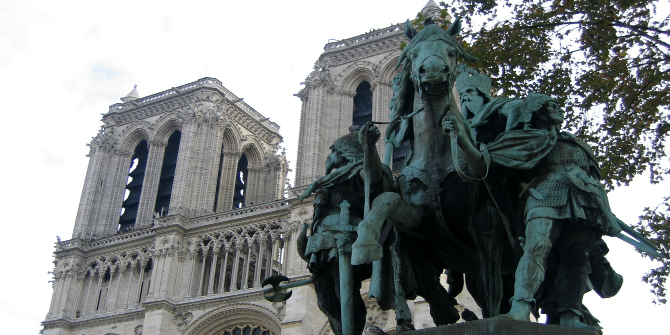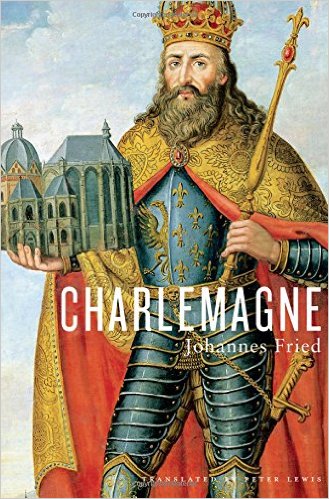In Charlemagne, Johannes Fried offers a new account of the life of the Frankish king and emperor, one of the most influential figures in European history. Although the limited surviving resources from the period make the book more of an in-depth account of the socio-political context of Charlemagne’s reign rather than a strict biography, Sara Perley welcomes this as a well-researched and engaging read that will foster curiosity about both Charlemagne and this lesser known period of history.
Charlemagne. Johannes Fried (trans. by Peter Lewis). Harvard University Press. 2016.
Charlemagne is one of the most well-recognised figures in European history, but as a man and a king, most know little about him. Johannes Fried’s book, translated from the German by Peter Lewis, attempts to change this. The work is an accessible, albeit long, account of Charlemagne’s life and times, sitting somewhere between the academic and armchair historian’s worlds. The text is well researched, provides an extensive bibliography and is an engaging and delightful read. It is well placed to foster curiosity and shed light on a lesser known period of history and this ‘late dark-age’ king.
The book covers Charlemagne’s life from his childhood to his death at the age of 65. It includes helpful maps of Charlemagne’s kingdom, eight high quality plates and some 60 images, a sizeable and useable index and a bibliography of selected works for further study. While sold as a biography, it would nonetheless have been fairer to label the book an account of the socio-political realities throughout Charlemagne’s life. There are few surviving sources about Charlemagne himself, and so the book focuses on domestic aspects of the Holy Roman Empire – the role of religion, education, the structure of the royal court and of general society. There is certainly nothing wrong with this largely successful and interesting account of the socio-political context of Charlemagne’s life: indeed, it provides a refreshing change from standard analyses that devote most of their time to wars, battles and conquests. But to call the work a biography is misleading, and without more discussion of Charlemagne’s international affairs, the work cannot be said to provide a well-rounded picture of Charlemagne as a person, of his rule or his empire.
For the most part, the work takes a positive view of Charlemagne and his activities, presenting him as something of a saviour of western civilisation and of western Christianity. The conversion of pagans to Christianity, for instance, is interpreted as a sign of Charlemagne’s civility. Charlemagne’s Admonitio (a collection of legislature reforming the Frankish Kingdom) ensured ‘murder, theft, unlawful marriage, and bearing false witness were all punishable offences’ (265). This is certainly one of the goals of the document, but here it is presented in such a way as to suggest that prior to the Admonitio, the pagan peasantry were lawless and obsessed with never-ending blood feuds.
 Image Credit: Statue of Charlemagne, Notre Dame, Paris (Thesupermat CC BY 3.0)
Image Credit: Statue of Charlemagne, Notre Dame, Paris (Thesupermat CC BY 3.0)
The same positive reading is presented in the few accounts of international interactions and warfare – the analysis of the failed betrothal between Charlemagne’s daughter Rotrude (Erythro) and the Byzantine heir Constantine VI glosses over what might have been Charlemagne’s political manipulations. In 787, Byzantine envoys came to court ‘begging him to allow Rotrude to become the wife of the basileus’ (145). Here, the author mentions Charlemagne’s potential involvement in the breakdown of relations, but then spends another page discussing the more plausible involvement of the Byzantine Empress, Irene. From the evidence given, neither party can be conclusively said to be at fault, but the manner in which the information is presented draws readers to conclude that Charlemagne tried his best – to the extent that Rotrude is called ‘the rejected bride’ (146). Charlemagne’s consequent refusal to use his daughters in international alliances, instead allowing them free rein, is used as further proof of his generosity and caring nature – a certain possibility, but there are other explanations, many less forgiving of an undeniably warlike king.
Part of this reading stems from the purpose of the work. The book attempts to bridge the divide between the academic and the general armchair historian. For the majority of the time, this is successful. However, there are a number of features that may grate on an academic audience, including lapses into narrative storytelling and conjecture. For instance: ‘Charlemagne may well have heard this psalm immediately before his coronation as emperor and could also have marvelled with his own eyes at depictions of the act, say, during his coronation in the confessional in St. Peter’s in Rome’ (368). There is no way to support or dismiss this suggestion.
The disconnect is also apparent when the author steps back from reaching a conclusion due to a lack of evidence. The work describes Charlemagne as a warrior king, for example, but then ultimately concludes that we have little concrete knowledge of what happened and why, leading to Fried to pose such questions as: ‘what objective, then was the king pursuing with the wars he waged (158)?’ and ‘did Charlemagne learn from his wars (162)?’ These questions certainly inspire thought, and for a general audience the storytelling adds interest and enhances the relatability of the subject matter. But a general audience also desires conclusions and definitive statements, academically rigorous or not; an academic audience may prefer a constructed, evidence-based argument. Without consulting the original text, it is difficult to determine whether the vague and unsubstantiated wording is a result of the translation or the original author. But, as stated in the preface: ‘the following book is not a novel, but it is a work of fiction all the same.’ At times, the text is therefore destined to skirt closer to fiction than true history due to the dearth of reliable evidence from Charlemagne’s era.
The work nonetheless exposes Charlemagne’s domestic world and describes what life may have been like for a noble in his court. Perhaps most inspiringly, Charlemagne poses questions for readers to consider, such as: ‘Charlemagne had been powerful and had known how to use his power. But had he been happy as well? Would he have even known how to frame such a question?’ (515). Taken at face value these questions are unanswerable, but they force the reader to think about what it means to live a good life, to be successful and how our very understanding of the notion of a ‘good man’ has changed.
Ultimately, Lewis’s translation of Fried’s work is successful in exposing a side of Charlemagne that most works do not. The translation provides English readers with a considered account of Charlemagne’s educational ideals, his relationship with Christianity and the Papacy and his attempts to construct a unified kingdom in something of an unstable world. The author creates a Charlemagne who tried his best to provide for his people in their physical lives as well as their afterlives. While the text may struggle to appease a purely academic or wholly general audience, it is one of the most accessible and perhaps well-rounded accounts of Charlemagne currently available.
Sara Perley is a Visiting Fellow at the Australian National University. Her PhD investigated the role that political intelligence played in the rise of the Roman empire. Her academic interests include intelligence and international relations in the pre-modern history, political history and peace and conflict studies. She is interested in patterns of continuity and change throughout history.
Note: This review gives the views of the author, and not the position of the LSE Review of Books blog, or of the London School of Economics.


 Find this book:
Find this book: 





1 Comments